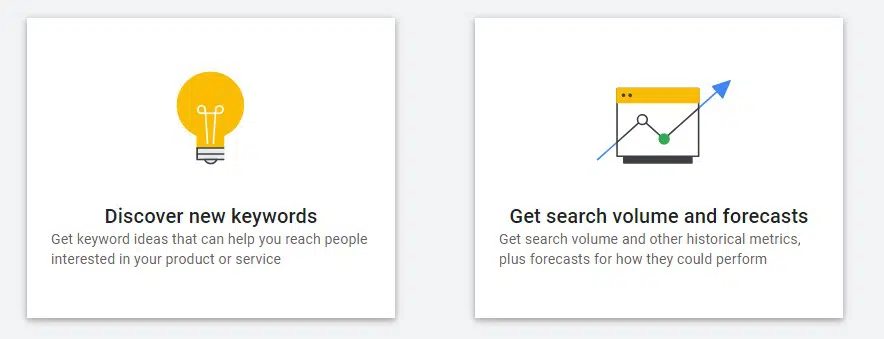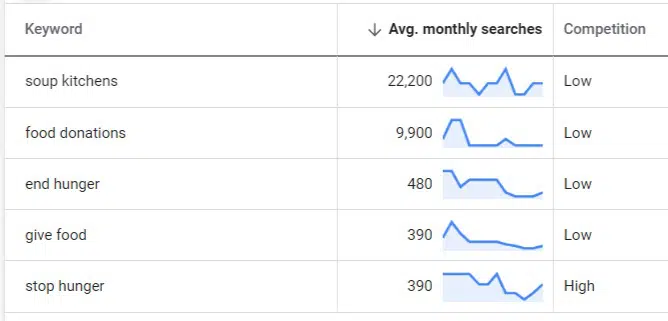Pinpointing the best keyword phrases for your organization is a crucial step to successful search engine optimization (SEO) for your website. Once chosen, your nonprofit can begin optimizing your content and start your climb to the top of search results. But how do you go about finding and choosing the right SEO keywords for nonprofits? Let’s break down the process.
Quick Refresher on Nonprofit Keywords
Let’s start with the big picture of WHY you’re optimizing for search and HOW you plan to use the keywords. Knowing these two components will help narrow down the list of nonprofit keywords you need and help you make strategic decisions about where and when they are used on your website.
Why you need keywords
The ultimate goal of any search engine optimization task is to increase the chance that your organization’s website shows up in relevant search results—and that searchers decide to click on your site in the sea of other options. When you target a specific keyword phrase, you’re saying that you want your website to show up at the top of the search engine results page (SERP) when someone searches for that phrase or a closely related one.
So how does a search engine know that your website offers information about a topic? Using keywords effectively in your website content is one of many signals to search engines that they should serve up your site in the SERP. If a search algorithm like Google’s determines that your website content matches what the searcher is looking for, offers high quality information, and provides a good user experience, you’re well on your way to SEO success.
When you look at the big picture, learning how to research, select and use SEO keywords is a way to take more control of your nonprofit’s online presence and reach new people.
How you’ll use keywords
The good news is that you don’t need to find keywords for all of the pages on your organization’s website. Some content might not attract a ton of interest or offer much value to someone who’s visiting your site for the first time. That’s OK!
Even more good news: you can start using keywords in your website content long after it’s been published. While it’s nice to write the pages of your website with a keyword in mind, you can always revise your pages or blog posts later to optimize them for search engines.
To get a feel for the actual process of optimizing for a keyword on a page, we have a bunch of step-by-step instructions and tips to share based on the latest SEO best practices:
- How to Optimize a Web Page for Search Engines outlines all of the places to use your keyword within a page. (No keyword stuffing, please!)
- How to Use the Yoast SEO Plugin to Get More Traffic details how to use a free plugin to grade and improve how you’ve optimized a page for a specific keyword.
- Voice Search Optimization for Nonprofits provides helpful tips on choosing and using keywords when thinking about voice search (i.e. people using an Amazon Echo or Google Home).
Get the SEO For Nonprofits Primer
Save some learning for later! Not everyone has time to become an expert in SEO for nonprofits. Get our recommended reading and how-to tutorials for search engine optimization basics.
"*" indicates required fields
Finding SEO Keywords for Nonprofits
If you were secretly hoping that we’d provide a list of top keywords for nonprofits, the following tips will show you why it doesn’t make sense to target generic keyword phrases that work for every mission out there. That said, a little brainstorming (and maybe some caffeine) can get you well on your way to a bucket of keywords to use on your website.
1. Know Your Nonprofit
Try making a list of words and phrases that are related to your organization and its work. What are the services and opportunities that you offer? This question may seem a bit basic, and for some organizations it will be pretty straightforward (a pizza shop can immediately answer, “Pizza, of course!”). However, your nonprofit might be more complex because it offers volunteer opportunities, fundraising events, donation opportunities, public outreach, and more all at the same time.
Consider an animal rights organization as an example. After brainstorming, they may come up with some of the following:
- What animals they serve
- What they do for those animals
- Types of resources they offer
- Ways donors can get involved
- The specific activities donations support
- Ways volunteers can help
- Resources they offer to animal enthusiasts
At this point, the animal rights organization will have a better idea of some keyword phrases they can explore to describe what it is they do and why people might care to learn more.
Knowing what your nonprofit offers, why it’s valuable, and how it’s different from similar organizations can help you choose the right keywords that attract the right audience.
2. Think Like a Searcher
Don’t just copy and paste your mission statement to your list of keywords. Ask yourself: How would the average person search for an organization like mine?
Ask your friends, family, coworkers, community or others how they would phrase what your nonprofit does. While you might think “aiding literacy” succinctly covers your nonprofit’s cause, imagine all the other ways someone might phrase it. Even a very specific keyword phrase like “aiding childhood literacy in the elementary school system” won’t cover every aspect. You can add more keywords by thinking like a searcher:
- kids reading
- curriculum development
- books for children
- make reading fun
- elementary school reading list
- teaching children to read
- great kids’ books
And get creative. Don’t just think of the obvious aspects of your organization. Instead, think of what someone interested in your organization would potentially be typing into that search engine or popular topics in your community that you might weigh in on. Put your target audience personas into practice to dig deep.
3. Avoid Jargon
Part of thinking like a searcher is avoiding the specialized vocabulary the folks in your industry use. Your website visitors – the people you want to volunteer or donate or use your services – likely won’t be searching the Internet for how they can “promote favorable outcomes by supporting breast cancer research initiatives.” However, they might be more likely to search for “how can I help to fight breast cancer” or “donate to breast cancer research.”
Strip out the jargon when brainstorming keywords. Remember to think like a searcher and keep the intent of their search in mind.
4. Get Specific
While it might seem like a good idea to have broad keywords that cover your domain of expertise (like “volunteer opportunities” or “places to donate”), choosing more specific terms like “volunteer work with horses” or “shoe donation in St. Louis” gives your nonprofit a better chance of showing up in the top results of these searches and converting visitors once they do land on your site. Very broad keyword phrases are often very competitive as well, making it hard for you to rank.
When you’re brainstorming specifics, ask yourself some questions:
- What differentiates your nonprofit from others doing similar work?
- Do you serve different locations of the country?
- Do you serve different sections of the population?
- What types of events or programs do you host?
- What makes these events or programs unique?
- Do you raise money to benefit a specific organization?
- What specific activities will your volunteers be involved in?
- What skills might volunteers be looking to develop?
- How do your volunteers’ experiences differ from those of other organizations’ volunteers?
Knowing the answers to these questions and ranking for these specific keywords can help your nonprofit not only rank well, but drive website visitors that are interested specifically in what your organization is doing. The goal should be to attract website visitors who are likely to land on your site and stick around and take action—not tons of people who click a search result and then bounce when they realize it’s not right for them.
5. Do Your Research
If this is starting to get overwhelming, or if you’re looking for extra help tackling the above steps, then Google has a tool for you: Google’s Keyword Planner. This handy website allows you to expand the list of keywords you’ve started to develop, as well as evaluate and tweak the terms you already have.
(Note that it’s a part of Google Ads, so you’ll need a Google Account to get access. But it’s free to use without ever creating or paying for an ad.)

For each prospective keyword you enter, the “Discover new keywords” part of the tool will give you more keyword ideas. For example, if you enter “helping war vets find jobs” the keyword tool suggests keyword ideas like “jobs for disabled veterans” and “military vets jobs.” This tool, coupled with knowing your nonprofit and thinking like a searcher, can help you extend your list.
Once you are satisfied with the size of your brainstormed keywords list, you can start to evaluate its quality with the “Get search volume and forecasts” option. As shown below, for each keyword you enter Google’s Keyword Planner will give statistics for two key factors: the number of average monthly searches and a competition rating.

- Average Monthly Searches: This number approximates how many times this keyword is searched per month on all devices, in all locations, and in all languages.
- Competition: This three-value competition rating (Low, Medium, High) is based on how many organizations have paid to advertise with that keyword.
You can use this information to decide which terms you should focus on, and which might not need as much attention. By balancing these factors, you can choose the keyword that will work best for your nonprofit.
Remember, picking keywords for SEO is about connecting your nonprofit with your target audience. You want to choose the keywords that match what a lot of people are searching for, but you also want to choose keywords that represent what your organization has to offer. That is, if you rank for “donating to new york charity” because Google’s Keyword Planner said lots of people execute that search, it won’t help very much if what you really want to do is fill volunteer openings in St. Louis.
For more tips and instructions on using this tool, check out the Semrush resource on using the Keyword Planner for SEO research.
At the end of the day, choosing keywords is about knowing your nonprofit and knowing your audience. The tips above can help you start to think about what phrases to use as you begin writing your website content and optimizing your site.
Are there any other tips you’ve found helpful when brainstorming keywords for your nonprofit? What obstacles have you come against when choosing keywords? I’d love to hear about your experiences with SEO in the comment section below.
Originally published on 9/12/12 by Michelle Lindblom. Updated with new information and tips on 11/10/21.

Really good article on keywords, I have bookmarked the site!
Hi Bill,
Thanks for the comment. I’m glad you found the post useful!
I have found this article to be very enlightening. I am desperately seeking a set of good keywords for my Nonprofit Organization.
I’m so glad you found the post helpful, Emma. Good luck with the keyword research!